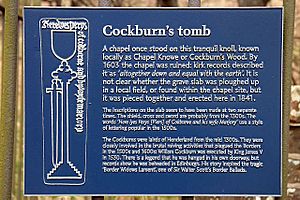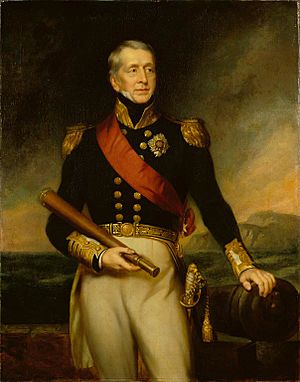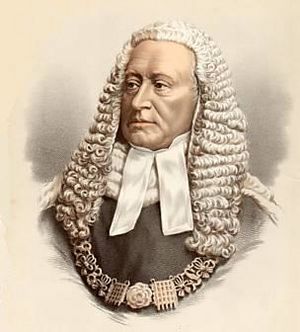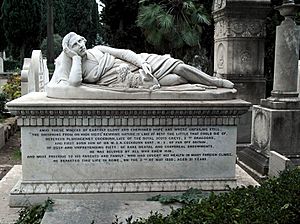Cockburn (surname) facts for kids
Quick facts for kids Clan Cockburn |
|
|---|---|
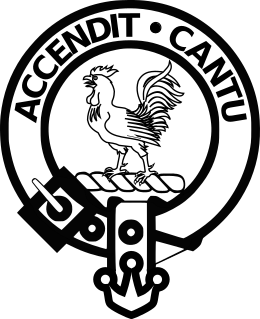
Crest: A cock crowing Proper
|
|
| Motto | ACCENDIT CANTU [from Latin: "He rouses us with song"]. |
| Profile | |
| Region | Scottish Borders |
| Animal | Cockerel |
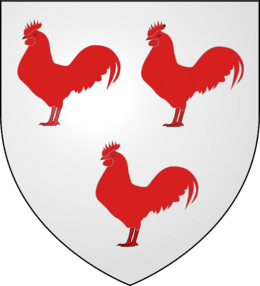 |
|
| Clan Cockburn has no chief, and is an armigerous clan | |
| Seat | Langton |
| Historic seat | Cockburn |
The name Cockburn (pronounced KOH-bərn or KOH-burn) is a Scottish surname. It comes from the Scottish Borders region in the Scottish Lowlands. In the United States, many families with this name now spell it 'Coburn' or 'Cogburn'. A French branch of the family uses 'de Cockborne'.
Contents
Where the Cockburn Name Comes From
The Cockburn surname first appeared in the early 1200s. It was used to identify people from a place called Cockburn. The name likely combines 'Cock' (from an Old English word for 'moor-cock', 'wild bird', or 'hill') and 'burn' (an old word for 'brook' or 'stream').
There are a few places that might be the origin of the name:
- A former 'Cokoueburn' area in old Roxburghshire.
- A place called 'Calkesburne' mentioned in a document from the 1100s in East Lothian.
- The hill called Cockburn Law, near Duns in Berwickshire. This hill had a fort from the British Iron Age.
- The town of Cockburnspath on Scotland's east coast.
Several places near Cockburn Law, like Cockburn farm and Cockburn Mill, also have the name. A old fortified house called Cockburn Tower was also in this area. It's not fully clear which of these places is the true origin of the family name.
One of the first mentions of a Cockburn is Petro de Cokburne. He was a witness to a document about land in Lempitlaw, near Kelso, around 1190–1220. Later, in the 1200s, other Cockburns like Robert de Cockburn and Johannes de Kocburn are mentioned in official papers.
In 1296, Pieres de Cokeburn and Thomas de Cokeburn signed the Ragman Rolls. This was a document where Scottish nobles promised loyalty to Edward I of England. However, at least one Cockburn, Nigel de Cockburn, was declared a rebel by King Edward I. His land was taken away. Later, in 1312, King Edward II gave Nigel his land back. This might have been an attempt to gain new Scottish allies.
Over time, the spelling of the name changed. Early spellings included 'Cokburne' and 'Kokeburne'. By the late 1600s, 'Cockburn' became the standard spelling in Scotland and other British Commonwealth countries. In the United States, 'Coburn' is more common.
Some Cockburns moved to other countries. In Cumberland, England, the 'Cockbain' family came from Scottish Cockburn ancestors. A branch of the family settled in France in the 1500s. They were mercenary soldiers who fought for the King of France. Their descendants in France now use the name 'de Cockborne'. Another French branch used the name Cokborgne and were part of the nobility.
The Cockburn name was also well known in the Caribbean from the 1600s. By the early 1700s, Cockburns lived in the Bahamas, Barbados, and Jamaica. Cockburn Town, the capital of the Turks and Caicos Islands, was founded in 1681 by salt traders from the Bahamas. Several Cockburns became important figures in the Caribbean, including doctors and colonial administrators. Some Scottish Cockburn men settled there and married local women. Their descendants live in Trinidad and Tobago and other parts of the Caribbean and North America today.
Important Cockburn Landowners
In the 1200s, several Cockburns owned land in Roxburghshire and Fifeshire. The Cockburns of that Ilk lived at Cockburn Tower, a small fortified house (now a ruin) on Cockburn Law in Berwickshire. They bought this land around 1527. However, in 1696, the Tower and land were sold to pay off debts.
In 1330, Sir Alexander de Cokburne became the Baron of Langton, Carriden, and Bolton. This happened after he married a wealthy heiress named Mariota de Veteriponte. The Langton estate was near Duns. Sir Alexander's second marriage added the estate of Skirling. His large land holdings were divided among his three sons. The Langton and Carriden lands stayed with his eldest son, Alexander. For the next 400 years, the Cockburns of Langton were important landowners in Berwickshire. Other family branches gained estates in Ormiston and Clerkington.
William Cockburn of Henderland was a famous border reiver (a type of cattle rustler and raider) in the early 1500s. He was known for his stealing and connections with English raiders. King James V wanted to show his power over these lawless areas. In 1530, William Cockburn was arrested and lost his lands. His son, also named William, managed to get the family's estate back in 1542. But his great-great-grandson, Samuel Cockburn, had to sell the Henderland estate in 1634.
By the mid-1700s, the Langton and Ormiston branches of the Cockburn family faced money problems. They lost most of their land. Sir Archibald Cockburn, 4th Baronet of Langton borrowed a lot of money to improve his Langton estate. His family continued to struggle financially. In 1747, Sir James Cockburn, 8th Baronet, could not pay his debts. The Langton Estate was sold in 1757. Even though they lost their land, the Langton Cockburns remained important in Great Britain, especially in the military and law. The Langton baronetcy (a special title) ended in 1880 when the 12th Baronet died without a direct heir.
The Ormiston branch of the Cockburn family started in 1370. John Cokburne, Sir Alexander de Cokburne's second son, married an heiress who owned the Ormiston estate. John Cockburn of Ormiston and his brother Ninian Cockburn supported the Scottish Reformation. John Cockburn of Ormiston (a later one) was keen on modernizing farming in Scotland. His plans also ran into financial trouble. He had to sell the Ormiston estate in 1747.
Famous Cockburns
Many notable people have the surname Cockburn:
- Adam Cockburn of Ormiston, Lord Ormiston (1656–1735), a Scottish judge.
- Sir Alexander de Cokburne (c. 1310–c. 1370), an important landowner in the Scottish Lowlands.
- Sir Alexander Cockburn, 12th Baronet (1802–1880), the 12th Baronet Cockburn of Langton and a top judge (Lord Chief Justice).
- Alexander Cockburn (1941–2012), an Irish-American journalist.
- Alison Cockburn (1712–1794), a Scottish poet.
- Bruce Cockburn (1945–), a Canadian singer-songwriter.
- Catherine Trotter Cockburn (1679–c. 1749), a British writer.
- Claud Cockburn (1904–1981), a British journalist.
- Sir Francis Cockburn (1780–1868), a British officer and colonial administrator.
- Sir George Cockburn (1772–1853), the 10th Baronet Cockburn of Langton and a British naval admiral.
- Hampden Zane Churchill Cockburn (1867–1913), a Canadian Army officer who received the Victoria Cross for bravery.
- Henry Thomas Cockburn (1779–1854), a Scottish lawyer, judge, and writer.
- James Cockburn (politician, born 1819) (1819–1883), a Canadian politician and one of the "Fathers of the Canadian Confederation" in 1867.
- James Pattison Cockburn (1779–1847), a British artillery officer and painter of watercolors in Canada.
- John Cockburn (Scottish politician) (c. 1685–1758), a Scottish politician and farming reformer.
- Karen Cockburn (1980–), a Canadian gymnast.
- Kofi Cockburn (born 1999), a Jamaican basketball player.
- Olivia Wilde (born Olivia Cockburn in 1984), an American actress.
- Patrick Cockburn (1950–), an Irish journalist.
- Robert Cockburn (wine merchant) (1781–1844), a soldier and founder of Cockburn's Port House.
- Robert Cockburn (physicist) (1909–1994), a British physicist who helped develop electronic countermeasures during WWII.
- Samuel Cockburn (mercenary leader) (1574–1621), a Scottish soldier who served in the Swedish army.
Cockburn Baronetcies
There have been two special titles called Cockburn Baronetcies in the Baronetage of Nova Scotia.
See also
- Cockburn (disambiguation)
- Coburn (disambiguation)
 | William M. Jackson |
 | Juan E. Gilbert |
 | Neil deGrasse Tyson |


